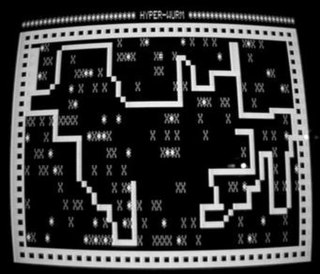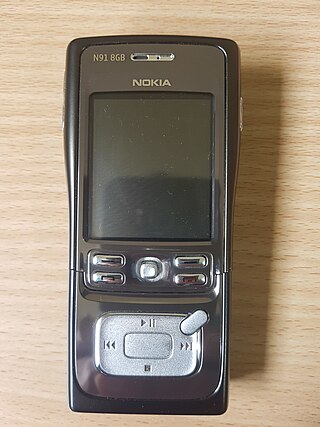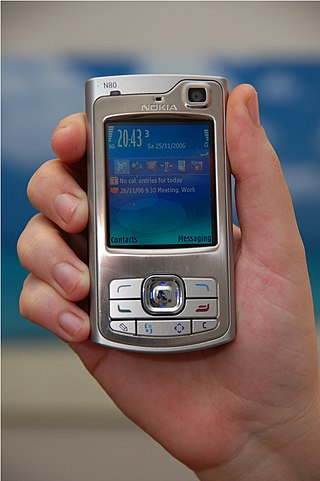
Snake is a sub-genre of action video games where the player maneuvers the end of a growing line, often themed as a snake. The player must keep the snake from colliding with both other obstacles and itself, which gets harder as the snake lengthens. It originated in the 1976 two-player arcade video game Blockade from Gremlin Industries where the goal is to survive longer than the other player. The concept evolved into a single-player variant where a snake gets longer with each piece of food eaten—often apples or eggs. The simplicity and low technical requirements of snake games have resulted in hundreds of versions—some of which have the word snake or worm in the title—for many platforms.

The Nokia N91 is a mobile phone produced by Nokia as part of their Nseries line of portable devices. It was announced on April 27, 2005 along with N70 and N90 as the first three Nseries devices. The N91 ran on Symbian-based S60 3rd Edition. It was the first ever phone encompassing a 4 GB internal hard drive, allowing storage for 3,000 songs. The N91 is highly focused on music,. with dedicated music keys on the front which slide down to reveal the keypad. It also featured the industry-standard 3.5 mm headphone jack, and was anticipated as a major challenger to Apple, whose iPod dominated the industry. The design of the N91 is based on stainless steel with a matte finish.

The Nokia N70 is a 3G mobile phone from Nokia. It was announced as part of the Nokia's new line of multimedia smartphones, the Nseries, on 27 April 2005. It started shipping in September 2005. It runs on the S60 2nd Edition, Feature Pack 3 on Symbian v8.1 operating system. It was succeeded by the Nokia N73. The N70 was popular and sold well.

"Porcelain" is a song by American electronic musician Moby. It was released on April 25, 2000, as the sixth single from his fifth studio album Play (1999). Written by Moby, who also performs vocals on the recording, "Porcelain" is a melancholic song with lyrics reflecting on the breakup of a relationship. It features a lush musical backing that incorporates reversed strings and various synthesized elements. While Moby initially expressed disdain over the song and its production, he was eventually talked into including it on Play.

The Nokia N80 is a 3G mobile phone from Nokia announced on November 2, 2005, part of the multimedia Nseries line. It runs on Symbian OS v9.1 and the S60 3rd Edition interface. It was first released in June 2006.

The Nokia N93 is a mobile phone from Nokia, part of the multimedia Nseries. It was introduced on 25 April 2006 and released in July 2006. It runs on Symbian OS v9.1 and the S60 3rd Edition interface. It was the most advanced camera phone from Nokia at the time of its release, and was particularly marketed for its swivel design like its predecessor Nokia N90, which mimics the appearance of a conventional camcorder.

The Nokia N79 is a Symbian OS v9.3 mobile phone and a member of the Nokia Nseries multimedia smartphone family running on S60 3rd Edition Feature Pack 2. It was officially announced by Nokia on 26 August 2008. The N79 is an advanced device with a 5 megapixel camera, dual LED flash, and GPS, with many improvements over the Nokia N78. It retailed for 350 euros upon release in October 2008.

The Nokia N72 is a mobile phone introduced by Nokia on April 25, 2006. It runs on Symbian OS 8.1a. It is effectively a re-branded Nokia N70 with a reduced feature set. It was released in June 2006.

XpressMusic was a brand name for a line of Nokia mobile phones that were specially designed for music playback. All of the XpressMusic handsets came with expandable MicroSD memory slots and dedicated music keys, so these phones could also be used as MP3 players. The XpressMusic range was launched in September 2006 to compete with the Walkman brand series from Sony Ericsson. Except the Nokia 3250, all XpressMusic models were marketed with the 5000 series prefixes.

The Nokia N95 is a mobile phone produced by Nokia as part of their Nseries line of portable devices. Announced in September 2006, it was released to the market in March 2007. The N95 ran S60 3rd Edition, on Symbian OS v9.2. It has a two-way sliding mechanism, which can be used to access either media playback buttons or a numeric keypad. It was first released in silver and later on in black, with limited edition quantities in gold and purple. The launch price of the N95 was around €550.

The Nokia N73 is a mobile phone announced by Nokia on 2006 as part of the Nseries and started shipping on 15 July. The N73 succeeded the N70 and packed in numerous multimedia features. It features a 3.2 megapixel autofocus camera, a front camera, a then-large 2.4-inch display, and stereo speakers, all in a relatively slim and pocketable size and form. It runs on Symbian v9.1. An improved, music-focused version called N73 Music Edition was released in 2007.

"Why Does My Heart Feel So Bad?" is a song by American electronica musician Moby. It was released on October 11, 1999, as the fourth single from his fifth studio album Play. It became a hit in several regions, including German-speaking Europe and the United Kingdom.

"Honey" is a song by American electronic musician Moby. It was released as the lead single from his fifth studio album Play on August 24, 1998. The song samples the 1960 recording "Sometimes" by American blues singer Bessie Jones. Moby first heard "Sometimes" on a box set collection of folk music compiled by Alan Lomax, and subsequently composed "Honey" around vocal samples from the Jones song.

"Sunday (The Day Before My Birthday)" is a song by American electronica musician Moby. It was released as the fourth single from his sixth studio album 18 on February 24, 2003. The song features samples of American singer and Sugar Hill Records founder Sylvia Robinson's song "Sunday".

The Nokia N78 is a 3G mobile phone made by Nokia. It was first introduced at the Mobile World Congress on 11 February 2008, and was launched on 26 May 2008 for €350 before taxes and subsidies. It runs on Symbian 9.3 and was marketed as a more cheaper Nseries device inside a compact, light body. The phone is compatible with the N-Gage 2.0 mobile gaming service.

The Nokia N86 8MP is a high-end mobile phone with emphasis on the camera. It was announced on 17 February 2009 and released in May 2009 as part of the Nseries. It runs on Symbian OS 9.3 and shares similar design features with the N97. Its name references the camera's megapixel count.

The Nokia N900 is a smartphone made by Nokia. It supersedes the Nokia N810. Its default operating system, Maemo 5, is a Linux-based OS originally developed for the Nokia 770 Internet Tablet. It is the first Nokia device based upon the Texas Instruments OMAP3 microprocessor with the ARM Cortex-A8 core. Unlike the three Nokia Internet tablets preceding it, the Nokia N900 is the first Maemo device to include phone functionality.

The Nokia Nseries was a high-end lineup of feature phones, smartphones, and tablets marketed by Nokia Corporation from 2005 to 2011. The Nseries devices commonly supported multiple high-speed wireless technologies at the time, such as 3G, or Wireless LAN. Digital multimedia services, such as music playback, photo/video capture or viewing, gaming or internet services were the central focus of the lineup. The lineup was replaced in 2011 by the Nokia Lumia line as the company's primary smartphone lineup.
Nokia's strategic nomenclature can be traced back in 2005 when the Nseries line was launched, offering devices with flagship specifications and premium hardware at various price points. These devices were considered the "bread and butter" of the company and were often positioned to showcase their latest technologies. Thanks to the newfound consumer and enterprise interest in smartphones at the time, the company introduced four additional collections to diversify their product portfolio and meet demands in most market segments. These new phone series were named Eseries, targeting small business and enterprise customers; Xseries, providing consumer-grade multimedia-focused devices; Cseries, which Nokia used to target both the low-end and mid-range market segments; and Tseries, for devices exclusive to the Chinese market.


















